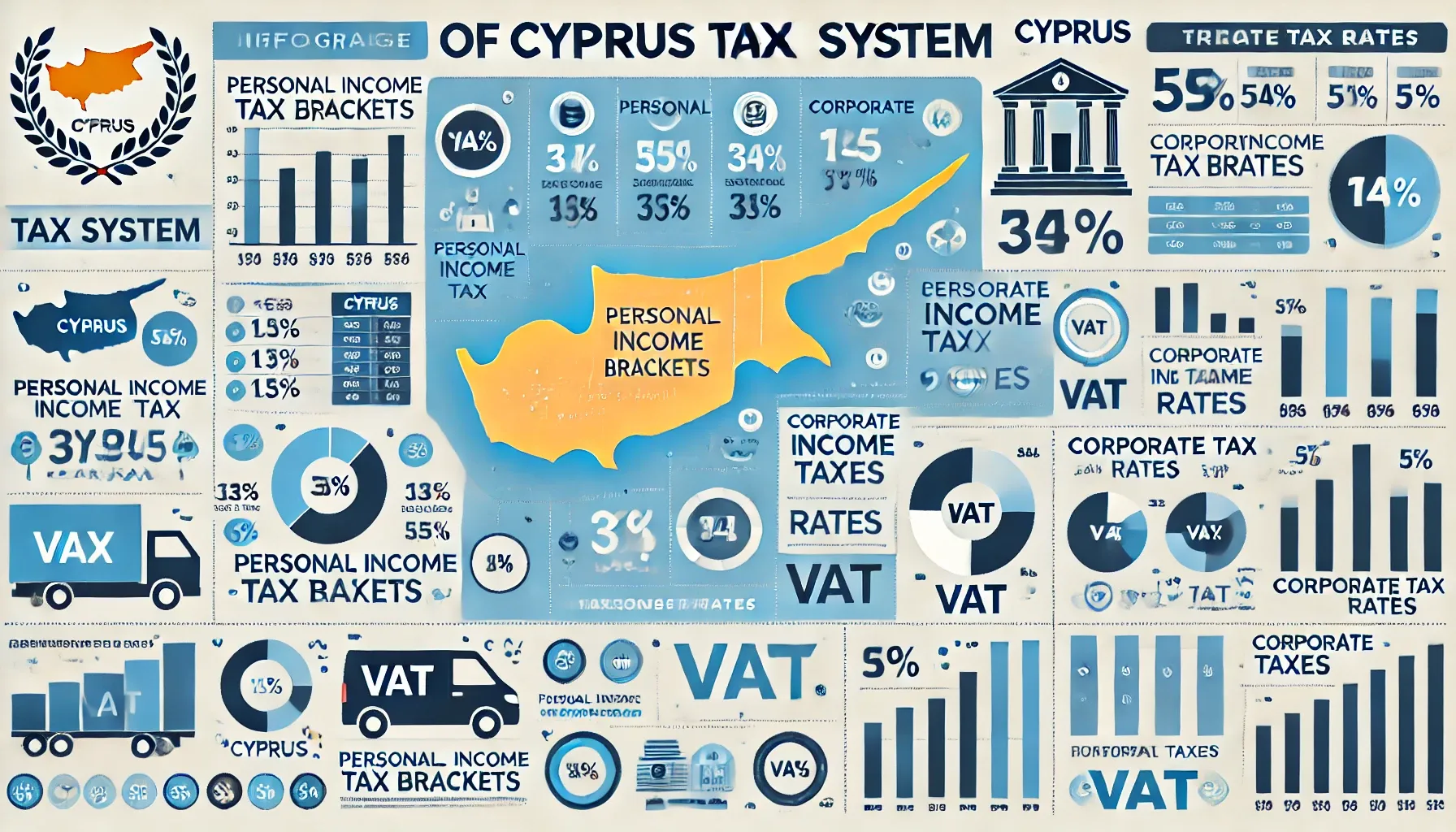What taxes do legal entities and property owners pay in Cyprus?

- Taxation in Cyprus: key aspects and features for residents and non-residents
- Property taxes in Cyprus: old assessments and the future of reform
Cyprus has a wide range of tax obligations for both individuals and legal entities. The taxes applicable to companies and property owners have their own specifics and different rates. Non-residents earning income within the republic are required to pay taxes in two main areas: income tax and corporate tax. Income tax pertains to the earnings of individuals, while corporate tax is based on a fixed amount —12.5%from the profits of legal entities.
Taxation of individuals
Individuals are taxed at different rates depending on the amount of their earnings. For example, if income does not exceed€19,500, no tax is charged. When income from€19,500to€28,000the tax rate is20%and with increasing income, it increases, reaching35%for amounts exceeding€60,000.
Taxes on real estate sales
When selling real estate in Cyprus, sellers are required to pay capital gains tax. The rate of this tax is20%from the profit received, which was the difference between the selling price and the base cost of the asset. The base cost can be set at the market value ofJanuary 1, 1980Considering the inflation, which is determined by the official consumer price index, during that period amounted to35,40.
Stamp duty
In addition, the stamp duty, known as the stamp tax, applies to many business transactions, including:
- registration of new enterprises;
- buying and selling of stocks.
It should be noted that international companies may have the opportunity to avoid paying this fee.
Value Added Tax (VAT)
In Cyprus, there is also a value-added tax (VAT) that is imposed on the sale of goods and services, as well as on the import of goods into the country. Currently, there are three categories of VAT rates in effect:
- standard rate in15%;
- reduced rate in5%;
- zero rate, equal to0%.
This creates flexibility in taxation to accommodate different types of activities.
Special tax for social needs
It should also be mentioned that there is a special tax for social needs, which amounts to2%of the payroll of all employees of the company, including unrestricted income data. However, international companies are exempted from paying this levy if their employees are not Cypriot citizens.
Avoidance of double taxation
According to the legislation of Cyprus, taxes paid in other countries can be credited when calculating tax obligations on the island. This prevents the possibility of double taxation, which is an important aspect for foreign investors and companies.
Annual fees for companies
As for the annual fees for businesses, all companies registered in Cyprus are required to pay a fee of€350by the end of June each year. Special rules apply for groups of companies and the total annual fee is as follows€20,000.
Special contributions on income
From the beginning2014and all the way through2016 yearA special income contribution has been introduced. The rates for income from salaries and individual entrepreneurs are set as follows:
- 0%up to amounts€1500;
- 2.5%on income in the range of€1500to€2500;
- 3%for income from€2500to€3500;
- 3.5%for all incomes exceeding€3500.
These measures demonstrate various approaches to taxation aimed at supporting local citizens and entrepreneurial activity in Cyprus.
Taxes relating to immovable property in Cyprus have their unique characteristics for both individuals and companies. The main aspect is that the taxable base is set at the assessments in force on January 1, 1980.
In 2013, the government of Cyprus conducted a revaluation of more than 500,000 real estate properties, resulting in the publication of updated data on the website of the land registry office. However, this innovation led to numerous complaints from property owners due to discovered erroneous valuations.
Saving old grades
Nevertheless, Cyprus continues to use price assessments conducted over 40 years ago. According to the latest report by Pricewaterhouse Coopers, prepared in January 2015, the tax system based on 1980 prices will remain unchanged in the current period.
Although such outdated assessments of laws ease the tax burden on property owners, allowing for a significant reduction in the amounts owed,The Cypriot government is committed to updating the cadastral system and adapting real estate valuation to modern realities. However, due to the complexities of the administrative processes, this update is progressing with notable slowness.
The future of tax reform
According to experts' forecasts, the tax base may be revised in the future, which could lead to changes in tax rates. Currently, property tax is determined based on the market value of real estate as of January 1, 1980, and it must be paid by September 30 each year.
The value of residential real estate is indicated in the documents that confirm ownership, known as titles.
Calculation of tax liabilities
In the table of tax obligations for property owners in Cyprus, based on their assessed value as of January 1, 1980, it is stated that:
- For objects valued at up to €12,500 based on old assessments, no tax is charged;
- If the taxpayer makes the payment by August 31, 2015, they will be able to receive a 10% discount.
If an owner has several properties, their values are summed up, and the tax is calculated on the total amount. This method allows owners to optimize their tax expenses.
Tax law reform
The government authorities of Cyprus continue to work on reforms in the taxation sector, although many of them are still in the early stages of implementation. Thus, issues related to property taxation remain on the agenda and are awaiting discussion and potential adjustment in the future.
For most property owners, this means that they still have the opportunity to benefit from the existing system until the new legislation comes into effect. As a result, Cyprus's tax system still holds significant interest for both property owners and government agencies looking to adapt it to the current requirements of property management.

Conclusion
In conclusion, I would like to summarize the tax system of Cyprus, which is based on unique historical and modern aspects. Cyprus, being an attractive place for business and investment, offers tax rates that are significantly lower than in most European countries. This creates an interesting situation for non-residents and foreign companies that consider Cyprus as a convenient jurisdiction for tax optimization.
Many tax rates, such asincome tax, so tooincome taxThey allow legal and natural persons to earn profits with minimal tax deductions. However, some aspects, such as the burdensome property assessment system, cause inconvenience to owners and mislead them due to outdated data from 1980. It can be confidently stated that the need to reform the cadastral system and reassess real estate in Cyprus is becoming increasingly urgent.
Considering that Cyprus continues to update its rules and procedures, it is important to stay informed about changes that may affect tax obligations and opportunities. I am confident that in the future we will see improvements in the tax system that will create even more favorable conditions for investors and entrepreneurs.
Cyprus tax legislation, despite some shortcomings, remains relevant and attractive to many, and a deep understanding of all its nuances will be the key to successful operations in this country. I hope that the information presented in this article has been helpful and will assist you in making informed decisions when interacting with the Cypriot tax system.
Comment
Popular Posts
9 October 2024
1958
9 October 2024
272
Popular Offers




Subscribe to the newsletter from Hatamatata.com!
Subscribe to the newsletter from Hatamatata.com!
I agree to the processing of personal data and confidentiality rules of Hatamatata











